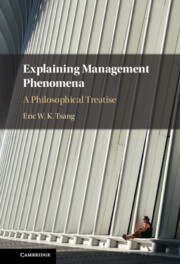Book contents
- Explaining Management Phenomena
- Explaining Management Phenomena
- Copyright page
- Contents
- Figures and Tables
- Preface
- Articles
- Chapter 1 The Nature of Explanation
- Chapter 2 Causation
- Chapter 3 Modes of Explanation
- Chapter 4 Microfoundations
- Chapter 5 Theory versus Non-theory–Based Explanation
- Chapter 6 Multi-theoretical Explanation
- Chapter 7 Research Methods
- Chapter 8 Explanation as Science (or Art?)
- Appendix Chinese Philosophy and Scientific Research
- Notes
- References
- Index
Chapter 5 - Theory versus Non-theory–Based Explanation
Published online by Cambridge University Press: 15 December 2022
- Explaining Management Phenomena
- Explaining Management Phenomena
- Copyright page
- Contents
- Figures and Tables
- Preface
- Articles
- Chapter 1 The Nature of Explanation
- Chapter 2 Causation
- Chapter 3 Modes of Explanation
- Chapter 4 Microfoundations
- Chapter 5 Theory versus Non-theory–Based Explanation
- Chapter 6 Multi-theoretical Explanation
- Chapter 7 Research Methods
- Chapter 8 Explanation as Science (or Art?)
- Appendix Chinese Philosophy and Scientific Research
- Notes
- References
- Index
Summary
A valid explanation may not be based on any theory, and luck can be a valid explanation of certain business events. Regression to the mean suggests that good performance (probably due to good luck) is likely to be followed by decline whereas poor performance (probably due to bad luck) is likely to be followed by improvement. When theory is used, there is a risk of theory-ladenness of observation, which challenges the traditional empiricist account of scientific observation as the passive reception of sense-data. The theory-laden view implies that different paradigms or theories may be incommensurable in the sense that their proponents may not be able to communicate with and understand each other meaningfully. However, both theory-ladenness and incommensurability are exaggerations and can be overcome. The example of yin-yang theory shows that it is important to distinguish between substantive theory (or theory in the usual meaning of the term) and metatheory. The former is used to explain empirical phenomena whereas the latter serves as the philosophical foundation for the former.
Keywords
Information
- Type
- Chapter
- Information
- Explaining Management PhenomenaA Philosophical Treatise, pp. 146 - 166Publisher: Cambridge University PressPrint publication year: 2022
